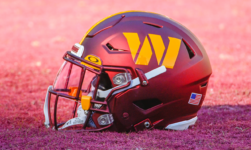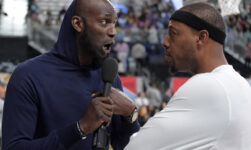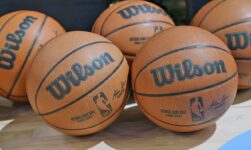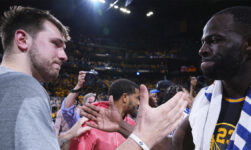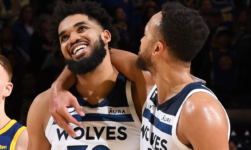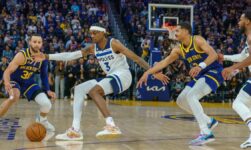Danny Ainge is a man of extremes. He’s either all-in on winning a championship — as he was when he swapped all of the Boston Celtics’ youth for Kevin Garnett and Ray Allen in the summer of 2007 — or he’s all the way out. When it became clear the Celtics were no longer a viable championship contender, he traded Garnett and Paul Pierce for an entire future in one fell swoop.
That always made the notion that the Utah Jazz might keep Donovan Mitchell after dealing Rudy Gobert somewhat laughable. Nothing about Ainge suggests he would be interested in chasing the play-in tournament for a year or two before Mitchell himself eventually forced his way to a contender of his own choosing. Ainge is many things. Delusional isn’t one of them. Once it became clear the Jazz in their previous construction were never going to win a championship, a full-scale reboot involving trades of both Mitchell and Gobert has felt inevitable.
So as we construct possible Mitchell deals in light of Adrian Wojnarowski’s reporting on the All-Star guard’s availability, we must do so through the lens of Ainge’s ambitions. This is not a man known for half measures. He isn’t going to want to make a deal that keeps the Jazz somewhat competitive. The name of the game here is picks and upside. In a perfect world, Utah will land assets that will pay off down the line without threatening its immediate efforts to tank. Here are the five teams best positioned to give the Jazz such a package.
Please check the opt-in box to acknowledge that you would like to subscribe.
Thanks for signing up!
Keep an eye on your inbox.
Sorry!
There was an error processing your subscription.
You’ve surely heard of the connections by now. Mitchell is represented by CAA. Knicks president Leon Rose once ran CAA’s basketball operations. Mitchell grew up in nearby Connecticut. His father worked for the New York Mets. The interest here is almost certainly mutual. The question is price.
The Knicks can send the Jazz as much draft capital as anyone. They have eight tradable first-round picks, including four of their own. In Immanuel Quickley, Obi Toppin and Quentin Grimes, they have a cadre of interesting youngsters for Utah to take a chance on. But the line in the sand here is probably former No. 3 overall pick RJ Barrett. After all, if the Knicks trade everything for Mitchell, they’re left with little room for improvement. Pairing Mitchell (25 years old) with Barrett (22) and Jalen Brunson (25) would give New York three young studs to grow around.
Would Barrett be a deal-breaker for Utah? Probably not, especially in light of the limitations facing other suitors here. If the Knicks put seven or eight first-rounders on the table, nobody else is going to top that. Right now, they’re in the driver’s seat with or without Barrett, and that likely suits Utah just fine. He’s too good to properly tank with anyway.
Miami’s limited draft capital is going to make a Mitchell trade difficult. The Heat don’t own any external first-round picks, and they owe one of their own in 2025 to the Oklahoma City Thunder. As it stands, they can send the Jazz two first-round picks, three swaps and 2022 first-round selection Nikola Jovic. If they get a bit creative in the language of the picks, they could send the Jazz a third, but that strategy isn’t without risks. The protections on the pick they owe the Thunder might delay its conveyance until 2026, and if it does, the Heat can only legally trade their 2028 pick afterward in accordance with a few notable CBA rules.
The Stepien Rule prevents teams from being without a first-round pick in consecutive drafts. The “Seven Year Rule” prevents teams from trading picks more than seven years out. In other words: The Heat could offer their 2023, 2027 and 2029 choices for Mitchell conditional upon their 2025 pick going to the Thunder, but if that lottery-protected Thunder pick isn’t conveyed in 2025, the 2027 pick would be bumped back to 2028 and the 2029 pick would have to convert to seconds because 2030 is more than seven years away.
Working in Miami’s favor, though, is Ainge’s long-standing interest in Herro. He was reportedly quite interested in adding the former Kentucky star with the No. 14 pick in the 2019 Draft, but Miami snatched him up one slot earlier. If Ainge views Herro as a cornerstone for a post-Mitchell roster, he’ll consider Miami’s offer.
One quick note that bears mentioning: While Mitchell and Bam Adebayo are both on Designated Rookie extensions, they can legally play on the same team because Miami drafted Adebayo. Mitchell cannot, however, play on the same team as Ben Simmons, who also has a Designated Rookie deal, but was traded to Brooklyn. Teams can have two Designated Rookie players provided at least one of them was drafted by the team in question. Speaking of Brooklyn …
As we’ve discussed, Simmons and Mitchell cannot both play for the Nets next season. So … what if Simmons was on another team? Here’s the scenario: The Nets trade Kevin Durant to a team capable of furnishing them with both draft picks and high-level veterans (let’s say the Toronto Raptors due to their endless supply of wings). They then turn around and flip Simmons elsewhere for draft picks, and as expected, trade Kyrie Irving to the Lakers for yet more draft capital. Suddenly, between three trades, the once-barren Nets have accumulated enough picks to flip to Utah for Mitchell, and through Durant, have also accumulated enough supporting talent around Mitchell to credibly contend in the somewhat near future (let’s say some combination of Pascal Siakam, Fred VanVleet, OG Anunoby, Gary Trent Jr. and Precious Achiuwa).
It’s not an immediate contender, but it’s not too shabby either, right? It’s at least a start, a foundation built on a 25-year-old All-Star who seemingly wants to be in their city and a supporting cast transplanted from the NBA’s best developmental infrastructure. Considering how limited Brooklyn’s options appear at the moment, it could probably do a whole lot worse than starting over with Mitchell.
The real hang up here is the deal’s mechanics. There are so many moving parts to consider. Is there a suitor willing to surrender multiple first-rounders for Simmons? Minnesota was the obvious one, but it just gave away everything for Gobert. Perhaps Cleveland? And would Durant accept a trade to any destination aside from his preferred Phoenix or Miami? Will the Lakers cough up a second first-rounder for Irving? So many things need to happen for Brooklyn to be viable. The path is there if the Nets want to take it, but it’s a treacherous one.
Let’s say Toronto isn’t especially enthused about trading for a 34-year-old Durant. Might Mitchell be a viable alternative? Toronto is so flush with defensive wings that protecting him on that end of the floor seems more than doable. His one-on-one scoring is exactly what they’ve lacked since Kawhi Leonard left, and his youth and three years of remaining team control would give them some runway to build around him.
But the fundamental question here is the same as the one facing Toronto in regards to Durant: Will the Raptors offer Scottie Barnes? The answer is probably no. Barnes is a possible future star. But Mitchell is a star right now, and unlike Durant he’s probably going to stay that way for quite some time. The Raptors might be surrendering some upside in taking the sure thing, but they’re getting rid of most of the risk of Barnes’ development stagnating. If he grows into a steady All-Star like Mitchell, his growth will be considered a success.
The Raptors traded for a star who didn’t want to be in Toronto once before. Losing Leonard likely scares Toronto out of the race. Unless Mitchell expresses significant interest in joining the Raptors, Barnes is simply too valuable to the hope that Mitchell is excited to be a Raptor and can lead you to a championship. Still, if they were going to give up Barnes for anything, a 25-year-old All-Star would probably be among their first choices.
This is one of those ideas that makes more sense on paper than in reality. Mitchell is better than CJ McCollum. He’s half a decade younger as well. New Orleans has up to six tradable first-round picks, and two of them could be valuable, high-upside Lakers selections. If New Orleans was primarily concerned about maximizing its title window, flipping McCollum for some assets and then going all-in on Mitchell would make plenty of sense.
But basketball isn’t played on paper. Teams simply don’t trade for established stars only to intentionally replace them six months later. McCollum was an essential locker room voice last season. They just aren’t going to break up what was a feel-good team last season to chase a borderline All-NBA player who would represent only a modest upgrade over their incumbent at his position. That’s not how basketball tends to work. If it was, the Pelicans would probably be courting Durant a bit more aggressively right now.
So no, the Pelicans probably aren’t in on Mitchell. They just happen to be one of the few teams with the assets to get him while remaining long-term contenders. Eventually, the Pelicans are probably going to push their chips in on a third star next to Zion Williamson and Brandon Ingram. It just probably won’t be Mitchell.

